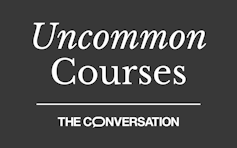
Lynda Kachurek, University of Richmond

Uncommon Courses is an occasional series from The Conversation U.S. highlighting unconventional approaches to teaching.
Course Title:
“For the Love of Books”
What prompted the idea for the course?
The idea for the class came from seeing University of Richmond students interact with the rare books and archival collections. Their curiosity about historic texts was not just with how the materials were made and used, but also with how these particular volumes survived and became a part of the university’s collection.
The course is offered as a first-year seminar. It is designed to focus on a specific topic while deepening students’ understanding of the world and of themselves as they build stronger research and communication skills.
What does the course explore?
The many ways the word “book” can be defined in the digital age. For most students, books are for homework or reading for pleasure, but I ask them to look deeper into the concept of a book by analyzing books through four themes: object, content, technology and art.
For books as objects, we look at books through their anatomy and structure, including paper and material form. Students then explore books as content, including how books are written, sold, read, collected and, sometimes, banned.
Changes in the technology of book production – the printing press in Europe after 1450 and the evolution of the digital book going into the new millennium – brought new ways to access information. Technology like DNA sampling of older books has helped scholars explore where they were made by studying samples from the parchment skins. New virtual and augmented reality technologies allow readers to experience books in new ways.
Why is this course relevant now?
When students focus on how the transmission of information has changed over time, they use books as a lens for social and cultural analysis. Exploring books as a communications technology, students develop a stronger understanding of how books have long influenced literacy, economics, technology, art and culture. In so doing, they also learn the histories, traditions and labor involved in the creation and distribution of information.
What’s a critical lesson from the course?
By choosing to focus on the history of books, the lesson is hopefully that what might appear to be something simple can often be deeply complex, far more meaningful and have more of an impact than students might expect. For instance, there has been a recent rise in requests to ban books in schools and libraries. By exploring the long history of book censorship, students can better understand the context of current events within that larger history.
Students also get firsthand experience with historical forms of printing. For example, students have the opportunity to hand-set type, letterpress print, and make different types of books as part of the hands-on work in class.
What materials does the course feature?
• Tom Mole, “The Secret Life of Books”
• Amaranth Borsuk, “The Book”
• Melissa M. Bender & Karma Waltonen, “Who’s Your Source? A Writer’s Guide to Effectively Evaluating and Ethically Using Resources”
What will the course prepare students to do?
Books are physical artifacts that connect today’s students with people from long ago and from faraway places, but books are also agents of change that have influenced societies and cultures for centuries. Students will be able to trace the history of the book and the exchange of information and ideas over time in a way that helps them understand both the historical context and how that continues to shape their world today.![]()
Lynda Kachurek, Head of Book Arts, Archives, & Rare Books, University of Richmond
This article is republished from The Conversation under a Creative Commons license. Read the original article.
